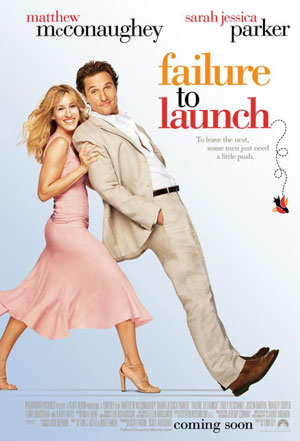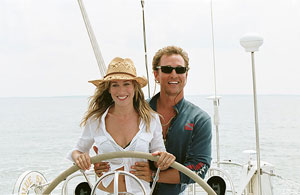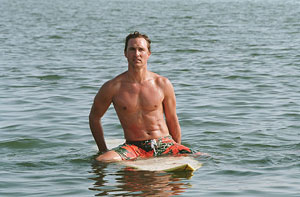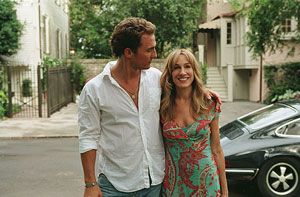 When I was at the New York ComiCon last week, I saw many men in their 30s who live at home with their parents. None of them looked like Matthew McConaughey, People Magazine’s Sexiest Man Alive. But that’s the magic of cinema for you, since in his latest film, Failure to Launch, the mad bongo playing bohunk stars as a 35 year old guy who still lives with mom and dad.
When I was at the New York ComiCon last week, I saw many men in their 30s who live at home with their parents. None of them looked like Matthew McConaughey, People Magazine’s Sexiest Man Alive. But that’s the magic of cinema for you, since in his latest film, Failure to Launch, the mad bongo playing bohunk stars as a 35 year old guy who still lives with mom and dad.
The film makes allowances for McConaughey’s looks and charm. He just happens to be an irresponsible slacker, who loves the ladies but hates commitment. When women get too serious for him, he brings them home to meet the parents, and the girl dumps him right away. Mom and dad (Kathy Bates and Terry Bradshaw) love their son, but want him out, so they hire an interventionist (Sarah Jessica Parker) whose job is to date guys and convince them to move out. Of course the two fall in love. Like I said, it’s a Hollywood movie.
McConaugheys’ a damn fine looking man in real life, and he’s personable and charming as well. It’s hard to sit across a table from him and dislike him.
Q: When did you leave home?
McConaughey: I left home the day I could. I left home two weeks out of high school; I went to Australia for a year as an exchange student. In my family when you turned 18 that was sort of the rite of passage to get on, get out, get on with it. I had a good family life, but I was ready to go.
Q: Could you understand this character? Could you understand where he was coming from in his urge to live at home?
McConaughey: The main thing I could understand is that he’s got a great relationship with his parents, he had a great relationship with his friends. He’s a good friend to them and a good son. He loves women. One of the things why that was important and cool to me is that it would have been very easy to make the story that his parents want him out of the house because he’s a pain in the butt; but he’s not. They like him there, and he likes being there. They want him out for other reasons. So he has healthy relationships with his parents, he has healthy relationships with his friends, he enjoys going out with different wonderful women and then if something gets serious, like he says, the set up is great – he brings them home, they meet an older couple, it turns out that it’s his mom and dad and they kind of do the breaking up for him. If I brought anyone home in my family, it was because I liked them.
Q: What was it that pulled you into this script?
McConaughey: The main thing was that I read the script and laughed out loud. I don’t do that that often. It was, besides being a romantic comedy, it was a heavy comedy. There was more comedy than in most romantic comedies, and all the comedy wasn’t just based on the guy/girl relationship. The scenario was still there, the mischief and the tricks they were playing on each other was there, but also as a guy I found that I saw that instead of playing the guy like he’s got a problem, he doesn’t think he has a problem. That’s more fun – he thinks he has it figured out and the people around him are helping him out.
Q: You’ve done a few romantic comedies.
McConaughey: They’ve been good to me.
Q: What are the challenges of finding something original in this genre? McConaughey: Well, one of the things in a romantic comedy that you have to do – and in some ways this is the easiest part but also the most challenging part – is that you have to keep it buoyant. You want to keep it light. The work was to keep this character like a boat, skimming across the surface. You have tendencies along the way to take something very literal and to think about it realistically but all of a sudden you’re in heavy drama, and that doesn’t work in a movie like this. You can’t take it down that far because it takes too much time to get back up to the comedic pace of the film. So in a weird way the tough thing is to keep it light, because the tendency is to get heavy in places.
McConaughey: Well, one of the things in a romantic comedy that you have to do – and in some ways this is the easiest part but also the most challenging part – is that you have to keep it buoyant. You want to keep it light. The work was to keep this character like a boat, skimming across the surface. You have tendencies along the way to take something very literal and to think about it realistically but all of a sudden you’re in heavy drama, and that doesn’t work in a movie like this. You can’t take it down that far because it takes too much time to get back up to the comedic pace of the film. So in a weird way the tough thing is to keep it light, because the tendency is to get heavy in places.
Q: Do you see this as your broadest comedy work?
McConaughey: Larger than life, maybe. This was probably more broad than like, How to Lose a Guy in 10 Days, but it’s still similar to that. But I got some places in here, like with the animals, where I got to go for it. And it was fun to do.
Q: What is next for you as an actor? What do you want to accomplish?
McConaughey: To keep having fun doing things and to grow while doing it. I have a lot of things that I really want to do that I’m developing with my production company. I got a rodeo drama, Evel Kneivel is something I want to do. I have something coming up called We Are Marshall, which is based on the true story of the football team at Marshall University in 1970 that was flying back from an away game when their plane went down. Everybody died: all the players, coaches, family members and everything. This is the story of the year after that when the town was split between, hey let’s just drop the program and go out gracefully, pay our respects and let it slide; and the other half of the town and the coach who came to town, were fighting to keep the program alive. Where any good coach knows about winning, in this case it’s not – we’re not going to be worth a damn, but we’re going to go out there and play our ass off. And if we keep the program alive – don’t let it die! – maybe there will, in the future, be a winning program, and that’ll be the honor and the testament to these kids and coaches that passed away. So that’s really the question in that story. And that’s happening in March, and that’s good drama.
Q: And you’re playing the coach?
McConaughey: I play the coach who came in from out of town. A lot of coaches didn’t want the job, as you can imagine. But look at them now. In their A they’re the winningest program.
Q: What about Sahara – how do you think it came out?
McConaughey: I thought the movie was close to what we were shooting for. I was over all happy with the film. I thought it was a lot of fun, I thought it knew what it was, I thought the film never tried to be what it wasn’t. Our plan, our hopes, was to make a franchise of them – that’s why I got involved, because I wanted to come back as Dirk Pitt. There are a bunch of books. We didn’t quite make the money that we had hoped to to greenlight another film. It’s doing great on DVD, and that might give us a chance to do another one. It did wonderfully international and it’s doing great on DVD. You know how much money you can make on DVD these days.
I’ll tell you, more and more I’ll have people come up to me – today someone said, ‘Yeah, I loved you in Two for the Money. I saw it last night!’ It’s almost like a whole new wave of people that will come up and say, ‘Loved in that movie, which is the second to last one you did,’ because a lot of people were introduced to it on DVD and never saw it in the theater.
people that will come up and say, ‘Loved in that movie, which is the second to last one you did,’ because a lot of people were introduced to it on DVD and never saw it in the theater.
Q: How do you feel about the day and date concept for DVD releases?
McConaughey: I don’t know. That’s DVD, television pay-per-view and theaters all at once, right? We’ll have to see. I’m not the one to judge that at this point. Do I have a hope that it doesn’t quell the filmgoing experience and that ritual that people have of going to the theater, which always was and still is an event – a family event, a dating event – where people get together for hours of your night? You get together, you go someplace, you get your ticket and there is a certain experience you get from watching it with 200 people. I have to say for myself, I watch more on DVD than I do in theaters. Now is that because I don’t want to go to the theater and be hounded? Not really. Sometimes it’s just easier; it’s more convenient and immediate. Boom, five minutes, hey let’s watch this. Nothing wrong with that. But I don’t know. We’ll see how that turns out.
Q: Can you go to the theater and not be hounded?
McConaughey: Sure. It’s two things – one is how you carry yourself. And also, sometimes someone will walk up to me and I’ll say, ‘Not right now. I’m thinking.’ Honestly. I’ll be working on something and someone will walk up to me and, not being rude, I’ll say, ‘Not right now, I’m eating.’ Or, ‘I’m going to a movie.’ Sometimes you have to remind people why you’re here. Like at the airport – I have to catch the flight. If they say you’re being rude, you say, ‘Wait, what are you doing here? Don’t you have to catch a flight too?’ And then they laugh and you move on.
But no, going out in public for me is something I’ve practiced and not ever will not do.
Q: When you started your first film did you expect to get here? Are you surprised to be as successful as you are?
McConaughey: I’ve definitely evolved from the beginning. The interesting thing about my career is that I went in reverse – I had a very successful film that made me famous right off the bat, A Time to Kill. And then later started to learn what the heck I was doing, started to work on my craft and take classes, which is what I’m doing now. I didn’t have any of that experience before. Did I expect to be doing that? Sure. Did I expect this is how it would work out? No.
Q: How do you feel about being so associated with romantic comedies?
McConaughey: I enjoy them. You have a scenario – the girl thinks something’s happening, but it’s not, I think something’s happening, but it’s not, we find out, and then it’s about handling a situation. It’s not life or death. I call them Saturday Characters. My work is to stay on a certain cloud. I enjoy it. When they work well, the work is in making them feel easy. Am I pigeon-holed? Nah. You stretch, but you don’t go against something that works for you and is also good business and you enjoy. That would be being eccentric for eccentricity’s sake.  Some of my most successful films have been romantic comedies and they have, absolutely, offered me more opportunities to develop more things that are personal. It makes it a whole lot easier if this film does well for me to get something like The Loop made for ten million dollars. It’s not something people read and go, oh I can’t wait to throw money at that. It’s a very peculiar, weird mystery. I really want to do it, but there’s no way I would be able to do it if I didn’t have successful box office.
Some of my most successful films have been romantic comedies and they have, absolutely, offered me more opportunities to develop more things that are personal. It makes it a whole lot easier if this film does well for me to get something like The Loop made for ten million dollars. It’s not something people read and go, oh I can’t wait to throw money at that. It’s a very peculiar, weird mystery. I really want to do it, but there’s no way I would be able to do it if I didn’t have successful box office.
Q: Having said that, how important is it having a serious role like in Amistad?
McConaughey: That was like a history lesson. There are some times when you get to do films and be part of a story and go, ‘They’re not calling it this, but this is philanthropy!’